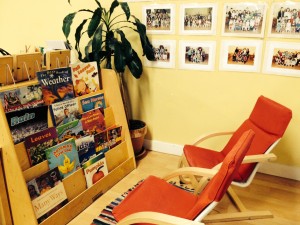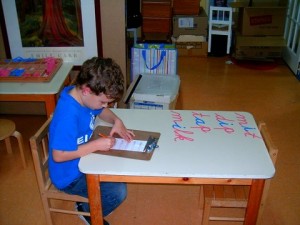 All families treasure books but sometimes it is difficult to decide which books to buy and which to borrow. In our Primary classrooms, we carefully select books for our library corner. You may be asking yourself, “what’s the Montessori criteria when choosing books for the young child?”
All families treasure books but sometimes it is difficult to decide which books to buy and which to borrow. In our Primary classrooms, we carefully select books for our library corner. You may be asking yourself, “what’s the Montessori criteria when choosing books for the young child?”
Here are a few characteristics that we look for before making each and every book available to our preschoolers:
- Reality: we provide books based on reality. Dr. Montessori wasn’t against fiction or fairy-tales but she believed that these books are best suited to the older children with a more mature mind and ability to abstract. The young child is trying to adapt and orientate to his/her environment and to make sense of the world he/she lives in. Therefore, these children crave and are more interested in books that deal with the world around then, animals, the environment and everyday activities.
- Diversity: we offer books that demonstrate diversity, show different cultures and different lands so as to expose the children to the vastness and beauty of our planet.
- Quality: we take quality over quantity anytime. We look for books that have large, clear, beautiful, high quality images that balances just right with the amount of text. Images must be captivating and inspiring. Also, we always make sure that the books are intelligent and don’t speak down to children.
Furthermore, when introducing the library and books to the children we follow the same procedure as with all the other materials in the classroom. We demonstrate proper handling and technique of use. We guide them towards the appropriate space to perform that activity and, finally, we allow them to work independently.
To be more specific, we also:
- Demonstrate how to turn a book’s pages carefully from the top right corner as well as how to carry a book properly by holding it with both hands.
- Ensure the child knows and understands where books are kept and is able to put them back after use.
- Provide a comfortable reading space (at home, you may think about having a corner with a few cushions in the living area as well as the bedroom or outdoor environment). We store books at the child’s height in a front-facing bookshelf (you may use other types of displays or even baskets). The young child is not able to associate a book by it’s spine so it’s best to store them where the child can easily see the cover.
- Do not interrupt a child reading (unless they are mistreating the book or are in danger). Children develop and exercise their ability to concentrate just by reading/looking at books. In addition to this, we accept the children’s choice by allowing them to choose a book to read without enforcing our preferences.
Please do not hesitate to ask your child’s teacher for specific suggestions of books and authors.
Happy reading everyone!
© Lions Gate Montessori

 We’ve been told it’s “old fashion” for our children to use cursive writing. In fact, most schools no longer teach it. So why do Montessori schools like ours still insist on using cursive? In most cases, it’s the most natural form of writing, but it’s also good for your brain! Find out how in this
We’ve been told it’s “old fashion” for our children to use cursive writing. In fact, most schools no longer teach it. So why do Montessori schools like ours still insist on using cursive? In most cases, it’s the most natural form of writing, but it’s also good for your brain! Find out how in this